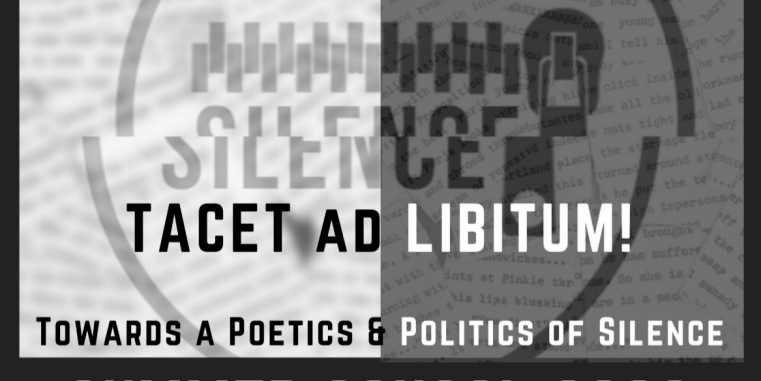

Description & Background
The events of the Münster Lectures and the International Summer School "Tacet ad Libitum! Towards a Poetics and Politics of Silence" took place from 24-29 July 2022. They were conceptualized as interdisciplinary academic events that also sought dialogue with the non-academic population of the city and the region. Organized by the doctoral students at the Graduate School Practices of Literature, the summer school aimed to question the logics, poetics, and politics of silence in contrast to those of speech (logos), with a view toward "silence" as tacere or Schweigen and secondarily as silere or Stille. Considering the global panorama of active participation in socio-political movements (of both oppression and insurrection), the summer school focused on silence's political dimensions within each of the event's three panels (Poetics, Politics, and Theory). The panels included two Masterclasses each, as the topic of silence was explored through the lens of the social sciences, philosophy, politics, religion, etc.
The summer school aimed to disengage the topic from its dominant "aesthetical" views, which tend to forefront the concept's negativity (as in the "unsayable" or the insufficiencies of language). Thus, perspectives which especially highlighted silence’s ethical and political interactions were closely studied. The topic was met at the threshold of practice and theory, academia, and politics. Here, theoretical and political models of "silencing" and "reticence" were used. Additionally, a productive dialogue took place between the international participants (coming from India, Pakistan, France, Iran, Belgium, China, Turkey, Lebanon, Cameroon, Italy, USA, Finland, UK, and Germany) which culminated in their individual presentations of corresponding projects on 27 July 2022. Since the summer school aimed to decipher socio-political issues implicated under the rubric of silence and speech - such as marginalization, the logic of exclusion, and the aporias of violence created in the name of inclusion - each of the speakers and participants approached the guiding concept from interdisciplinary and transnational perspectives.
The Events
The Summer School was guided by an ethic of community outreach, placing academia in dialogue with the community around the city of Münster. We encouraged the citizens of the city to join us in open dialogue at the Münster Lectures and the Public Lectures which were held each evening.
Münster Lectures
The summer school was kickstarted on 24 July 2022 by its inaugural event the Münster Lectures, titled "Breaking the Silence", which comprised two talks. The first, titled "Activism and Documentation as Tools of Resistance", was delivered by Jennifer Kamau, who is the spokesperson for International Women* Space (IWS): an organization co-founded by Kamau in 2012. An anti-racist and feminist collective, IWS is made up of refugee, migrant and non-experienced women. Kamau’s talk began with the screening of a video titled "Kämpfer*innen", which is part of a documentary film currently in the making from IWS. The screening was followed by discussions about the topics of authorship, structural and political (in)visibility, as well as about ideas on resisting narratives and narrating resistance.
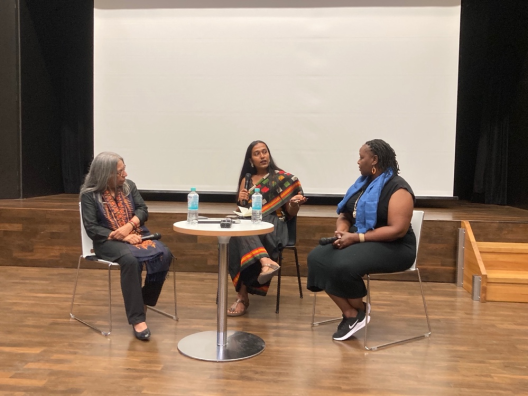
The second lecture, "A Question of Silence", was delivered by Urvashi Butalia, a feminist writer, publisher (CEO of Zubaan Books) and an activist from India. Butalia's talk focused on women in India and traced, through the history of the first feminist publishing house in India, the trajectories of the women's movement in addressing the many silences women live with. Kali for Women, India's first feminist publishing house, established in 1984, came about as a direct result of the absence of knowledge about women on which activists could base their activism. Can knowledge address silence and absence? This was the key question that the talk addressed and included the politics and ethics of feminist publishing as a subversive practice.
Summer School
The program of the summer school was comprised of daily master classes, held for the attendees, which were young researchers and master students, and featured each evening one of four Public Lectures, delivered by a distinguished guest speaker. The lectures were also lived-streamed on Zoom and on the Opencast platform
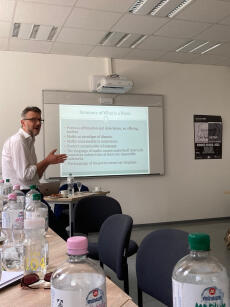
Prof. William Watkin from Brunel University delivered both the first Masterclass and the first of the Public Lectures. Titled "Multiplicities of Silence," Prof. Watkin's lecture was part philosophical deconstruction of the limits of what is sayable, part spoken-word performance art, and part cautionary tale: warning the next generation of academics to not fall into the entrenched traps of identity and difference (and différance). Instead, by stitching together texts from the Gnostics to Badiou, Watkin attempted to outline a vision of philosophy's future, one where indifference and silence constitute an outside to philosophical discourse, and where, he argues, that philosophy must move towards if it wants to continue to engage the most critical questions of contemporary world.
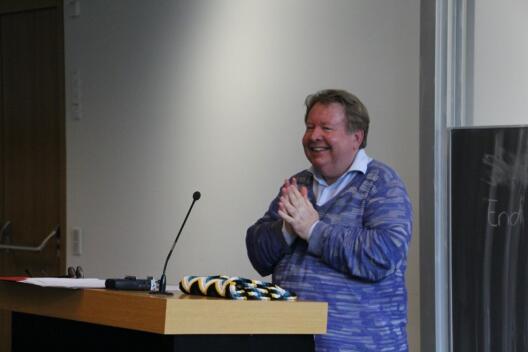
Prof. Alexander García Düttmann, from the Berlin University of the Arts, delivered the second of the Public Lectures: "Wer kann schweigen? Heidegger, Wittgenstein, Bergman" (in English: "Who Can Be Silent? Heidegger, Wittgenstein, Bergman"). Prof. Düttmann, a student of Derrida who grew his critical bones in the Theory Wars of the 1980s, delivered a treatise in German about the cracks, fissures, and complications among the binary distinctions between speech/silence and silence/muteness.
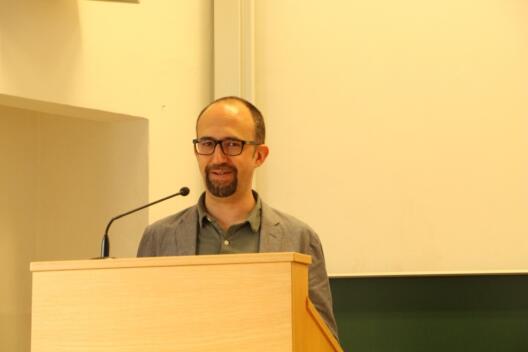
Prof. Adam Kotsko, from North Central College in Naperville, Illinois, brought a distinctly US voice to the conversation surrounding political silence. A native of Flint, Michigan, Prof. Kotsko is specifically aware of the patterns, rituals, and absurdities of current American politics. Titled "Toward a Political Theology of Silence," the Summer School's third Public Lecture approached the topic of abortion rights in the US from the perspective of a political theology of silence. Beginning by detailing the ways silence constitutes a foundation of music, Prof. Kotsko extended this to a reading of the foundations of political unity - especially considering how the concept of the "silent majority" of US voters historically emerged in response to the political use of fetal imaging technology, where the fetus acts as the perfect silent victim on behalf of which most any political claim can be justified.
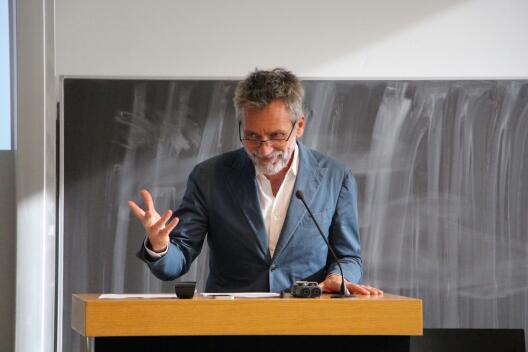
Prof. Peter De Graeve, from the University of Leuven, delivered a captivating philosophical lecture, titled "On Being Silenced (Echoes of the Ineffable)." Echoing many of the claims made by Prof. Watkin, Prof. De Graeve outlined many of the failures of Western philosophy to provide an adequate answer to modernity's "noisesome" discourses. As many of the major voices in the 20th century - Martin Heidegger, Jean-Luc Nancy, Gianni Vattimo, and so on - attempted to respond to the Western metaphysics, in the form of "breaking up" it structures, or "weakening" them, no real relief was achieved to the noisy rush of the current historical moment. Instead, De Graeve attempts to introduce a thinking away of the primacy of ontology by thinking the "echoes" (ἦχος) and "havings" (ἔχω) of our history. De Graeve urges us to listen to the echoes of the “big silence” which was lost in history's turn away from ancient myth and religion. De Graeve conceives of an "Echo´-logy", which suggests that a profound attention to this deep and urgent silence can answer the intellectual cries of modern philosophy, provided that we are willing to bracket the “prima philosophia” from its hierarchy, until the silenced echoes of our history are heard again.
Graduate Student Paper Presentations
The event culminated in a day-long conference in which the graduate participants were able to present their own research on the topic of silence and receive feedback from a panel of experts. The panels were divided according to the three major themes of the Summer School (Poetics, Theory, and Politics), though due to the vast interdisciplinary nature of the primary topic, many of the presentations featured two or more of the themes. In addition to the in-person attendees, a few young researchers were able to join via Zoom.
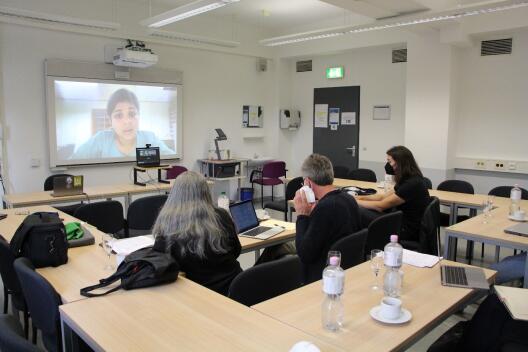
A Word of Appreciation
We would like to thank the Department of Philology (FB09) and the Graduate School "Practices of Literature" for their continued support. We would also like to thank the Chair of English, Postcolonial, and Media Studies and especially the secretary to the Chair, Annika Feldhof, for their immeasurable help and support. Finally, we would like to show our gratitude for the support provided by University of Münster's Gleichstellungsbüro, the International Office, and especially to the Universitätsgesellchaft, which together were indispensable for the realization of the Summer School and the Münster Lectures.

